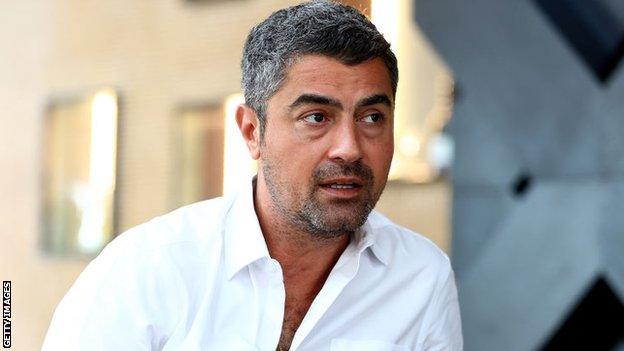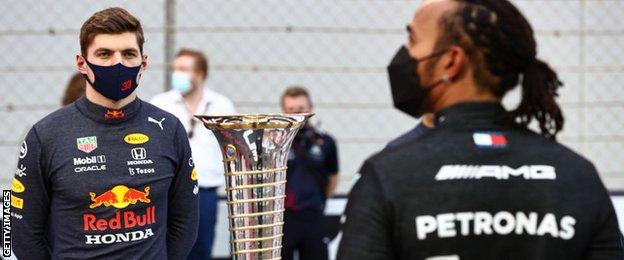Michael Masi: FIA may end spell as race director after Abu Dhabi controversy
- Published

Race director Masi's decisions came under intense scrutiny after the season finale in Abu Dhabi
Formula 1 could have a new race director in 2022 following the controversial Abu Dhabi Grand Prix, the FIA's head of single-seaters says.
The sport's governing body is conducting a review into 2021's final race, when the safety car rules were not followed correctly by race director Michael Masi.
Peter Bayer, newly appointed as the FIA's head of F1, said: "Michael did a super job in many ways. We told him that.
"But also that there is a possibility there could be a new race director."
Bayer, who has long held the role of the FIA's secretary general for motorsport, is conducting the inquiry launched following the controversy of Abu Dhabi.
Masi failed to follow the rules in two different ways at Yas Marina - over the handling of lapped cars and over the timing of the restart of the race.
When the race was restarted for one final lap, Red Bull's Max Verstappen, on fresh tyres, passed long-time leader Lewis Hamilton, on used tyres, to beat the Mercedes driver to the title.
The result caused widespread uproar because Masi appeared to over-ride the rules with regard to the operation of the safety car, having come under pressure from the bosses of the two title-contending teams.
Hamilton is said to have lost faith with the FIA, and will not decide whether to return to F1 in 2022 until he sees the results of the FIA's inquiry.
The FIA is working on a new structure for race control, as BBC Sport reported on Thursday, and Bayer said this was likely to involve splitting the responsibilities Masi formerly held between a number of different people.
Bayer, speaking to the respected Austrian journalist Gerhard Kuntschick, said: "(We are looking at) dividing the various tasks of the race director, who is also sports director, safety and track delegate.
"That was simply too much. These roles are divided between several people. This reduces the burden on the race director."
Bayer confirmed that a revision of the safety-car rules was being considered, as well as a restructuring of race control.
He pointed out that in the US-based Nascar series, "if neutralisation is necessary in the last two laps of the race, the lap counting ends and the laps are added at the end of the safety car phase. This could cause a fuel problem in F1, which is why it is being looked at more closely.
"We also asked the teams if their requirement not to finish a race under safety car was still relevant, to which they all agreed."
And he said the FIA was considering setting up a "mission control" at its base in Geneva - similar to the remote strategy groups the F1 teams operate over race weekends - to support the race director.
He confirmed that the team bosses would no longer be able to talk directly to the race director.
"The team managers will still be able to - they have to be able to ask questions," Bayer said.
"We want to build in a buffer with an employee who accepts these requests.
"In the future, the race director will be able to concentrate on his task and will no longer be distracted."
Bayer underlined that he was only in a position to advise on changes. He would submit his plans to the FIA president Mohammed Ben Sulayem, he said. The two would agree a proposal, which would be submitted to the FIA World Council.
That will happen on 18 March, on the eve of the new season. However, although Bayer did not specify it in the interview, his plans will be presented to the teams at a meeting of the F1 Commission on 14 February.
If the F1 Commission - composed of the FIA, F1 and the teams - approves them, the World Council is a rubber-stamping process.
What about the race result?

Lewis Hamilton (right) is still short of the eighth world title that would see him alone at the top of the all time standings
Mercedes protested against the result after the race in Abu Dhabi, but this was rejected by the stewards.
They gave notice of intention to appeal against that decision, but decided against it after three days of talks with the FIA, after receiving guarantees that the controversy would be taken seriously and action would be taken.
Bayer said that he believed the result of the world championship would not have been changed even had Mercedes gone through with their appeal process.
"Had the Mercedes protest gone to the Court of Appeal, after being rejected by the stewards, what would have happened?" Bayer said.
"I think the judges would have said: 'It's different in the regulations, he decided that way, so we could just void the result.'
"But even then - if it were cancelled - Max Verstappen would have been world champion (because he was ahead going into the race).
"The situation was far from perfect and that's why we're working on it. It's also about having respect for the race director.
"My job is to look ahead, how can we improve things?"